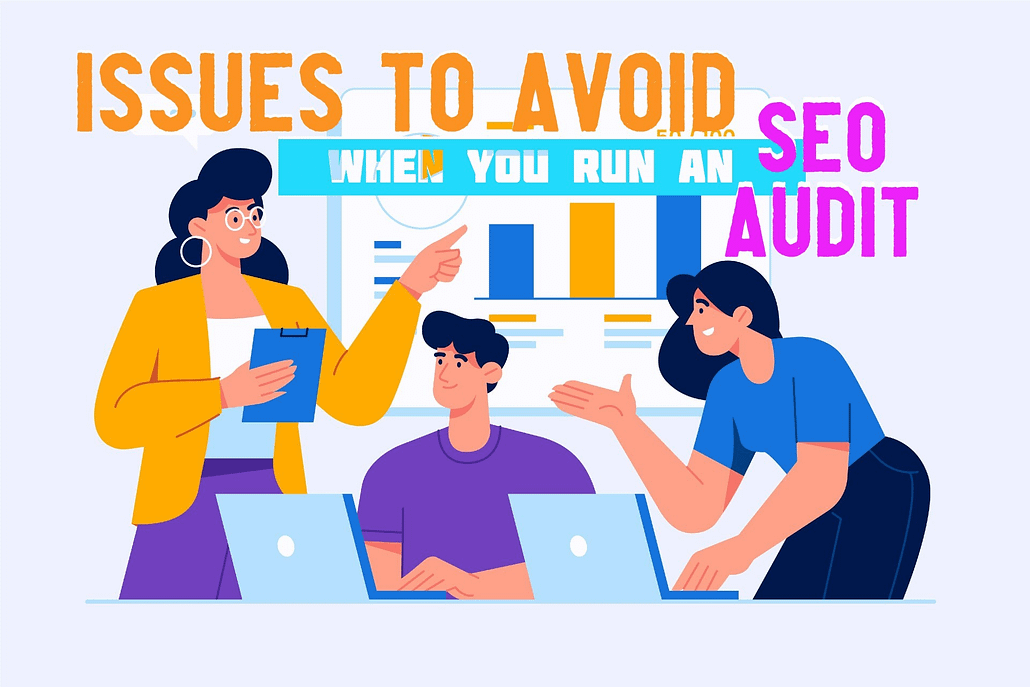Common SEO Mistakes; That Are Undermining Your Website
You know when you spend a lot of money and time working on your site to get it where you want it, but you still aren’t getting the traffic you want? Or when you’re always left wondering why your rivals have higher rankings than you despite having less authority and weak UX?
An SEO website audit is a solution to your problem. SEO audits will improve your site’s search engine rankings, generating more sales, leads, and visitors. Don’t know where to begin? To find out, read this comprehensive guide to conducting an SEO website audit and issues to avoid when you run a website audit. But first, we need to go over what an SEO audit is then we will dive into knowing how to run an SEO audit in 2021.
First Thing First,
What is a SEO audit?
SEO audit is a website assessment that ranks the site based on its potential to appear in search engine results pages (SERPs). Audits are done by reviewing each phase on your audit list and identifying any problems that need to be corrected or changed to enhance your website’s search engine performance.
A complete SEO audit provides you with an actionable plan that will assist you in:
- Compare yourself against your rivals and use the results to your benefit.
- Determine what changes must be made (and how to change them).
- Get a general overview of your site’s SEO performance.
- Discover and correct the website’s flaws.
- Set some goals for the future of your website.
You may not be able to change every finding on your SEO audit simultaneously, but you can work on many factors over time. The following are the problems you should concentrate on during your SEO audit.
First, let’s go through the variables that have the most influence on your rank, so you know which ones to concentrate on when you try to maximize efficiency. Here are five things to consider when creating a website for better performance or ranking.
1. User-friendly content: This is most likely the most critical ranking factor, as well as the most time-consuming since it involves researching and publishing material that your target market wants to read. That is why you need a blog or other content-rich component for your website.
2. Keywords: They are the phrases (no longer single keywords) that connect you with your target audience. To begin a query, users type these terms into the search box. Website owners select keywords that users often use to adapt their content to users. Not all keywords are created equal, as others are more relevant to your company and receive a higher volume of monthly searches. Choose a dozen or more keywords that are important to your needs, and then create content around those keywords.
3. Social media engagement: It serves as a recommendation for your website, so the more people who comment, like, and share your content, the better Google believes the content is.
4. Backlinks and links: It serves as additional validation for your content. Backlinks represent other websites that link to your content, implying the importance of that content, while links within your content demonstrate that you researched the subject. The more authority you give to both links and backlinks, the more influence they will have on your performance.
5. Mobile-friendliness: It is a significant ranking factor as more users shift their search to mobile devices, and Google wants the experience to shine.
Now, you know the factors that might impact your SEO. Let’s discuss how to run an SEO audit in 2021 to avoid making SEO mistakes person makes!
1. Stuffing Your Website with Keywords
One of the most popular SEO myths is that stuffing your website with keywords would make you rank higher in search engines. Although this was valid fifteen years ago, keyword stuffing the website is now considered a “black hat” strategy. It is not only ineffective, but it will harm your rankings and may result in a penalty or ban. And don’t presume you won’t get caught—search engines have become remarkably good at detecting keyword overuse. Instead, invest in good content with a focus on a specific subject.
Tip: Keyword stuffing is not only inefficient, but it can also damage your search engine rankings.
2. Under optimized posts and pages
When it comes to SEO, page and post titles (H1 tags) are among the most significant variables to remember. Both search engines and consumers need to see your keywords at the beginning of your content. Page titles will help you increase your page rank by a significant amount, and if you want to test this, you can look into A/B checking different H1 titles to capitalize on this ranking aspect.
Tip: Create distinct title tags for each page that are brief but informative – not ambiguous.
3. Doing Your Own SEO Instead of Hiring an Expert
SEO is full-time work that necessitates extensive knowledge of emerging trends, methods, and algorithm changes. Many marketing experts understand the fundamentals and feel they can do their own SEO. The reality is that they can’t, and they discover this the hard way. True SEO practitioners keep up with all of the latest developments and have first-hand knowledge of what works and what doesn’t. You don’t want to play with your website and end up with problems that would cost you more time and money to repair.
Tip: Hire an SEO expert to assist you with your website.
4. Not conducting regular SEO audits
If you want to optimize your SEO, you must conduct an SEO audit regularly. Although numerous daily checklists are available, the most important audit you can perform is in your search console, which is completely free. Your Google search console provides a wealth of performance information, such as mistakes, top results, average location in the search, site vitals, and much more. You can also audit your results with free software.
Tip: Look for a tool or platform that can better support you and your organization’s needs.
Conclusion
As you can see from this discussion, it is simple to make SEO mistakes that can harm your website in the long run and reduce its results. Obviously, these are just a few of the many SEO mistakes you can make. Hopefully, the SEO audit tips mentioned above will help you correct these errors and look for other possible SEO mistakes once you’ve learned these tactics!




